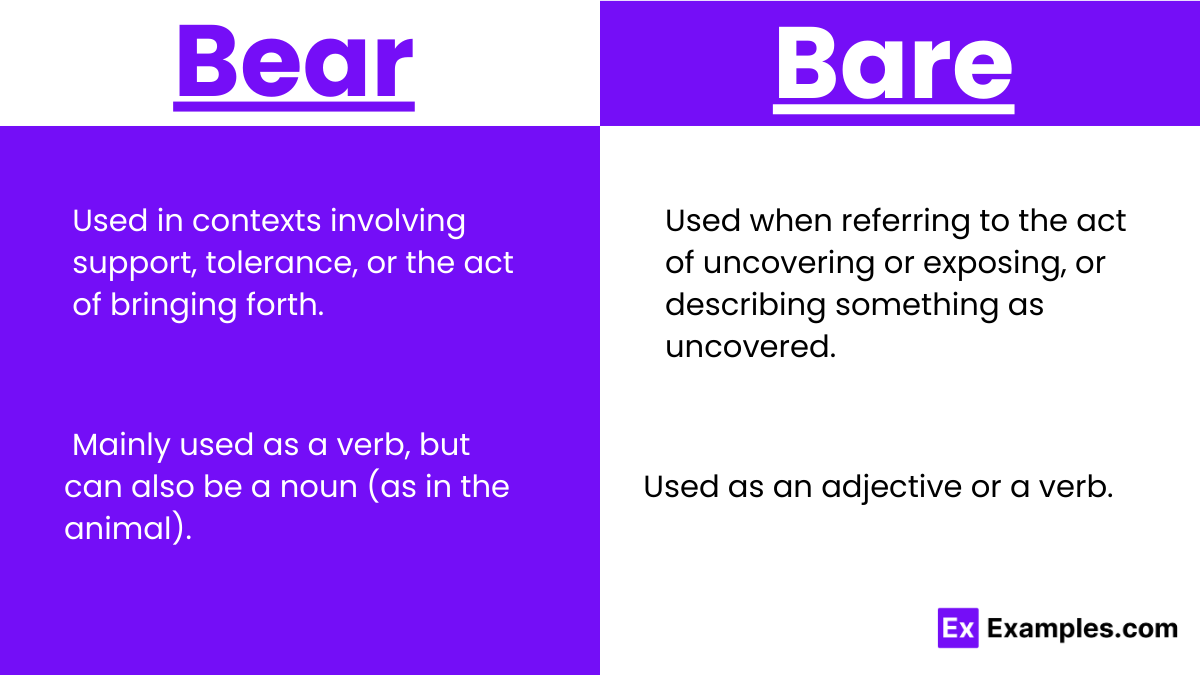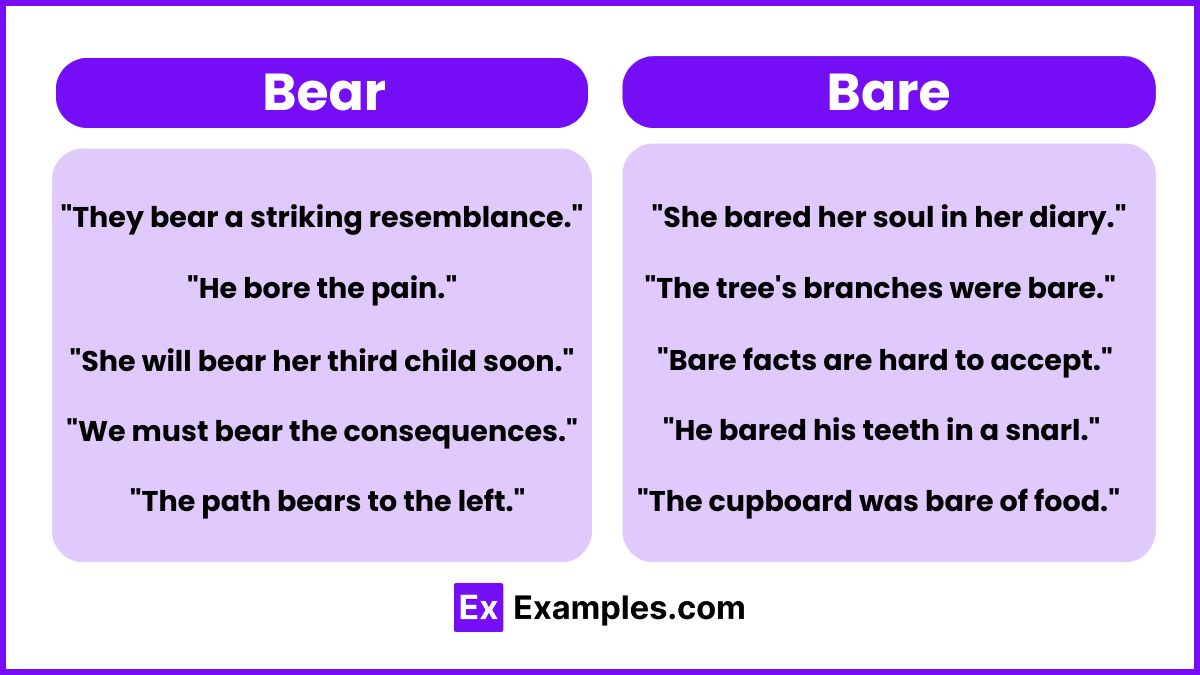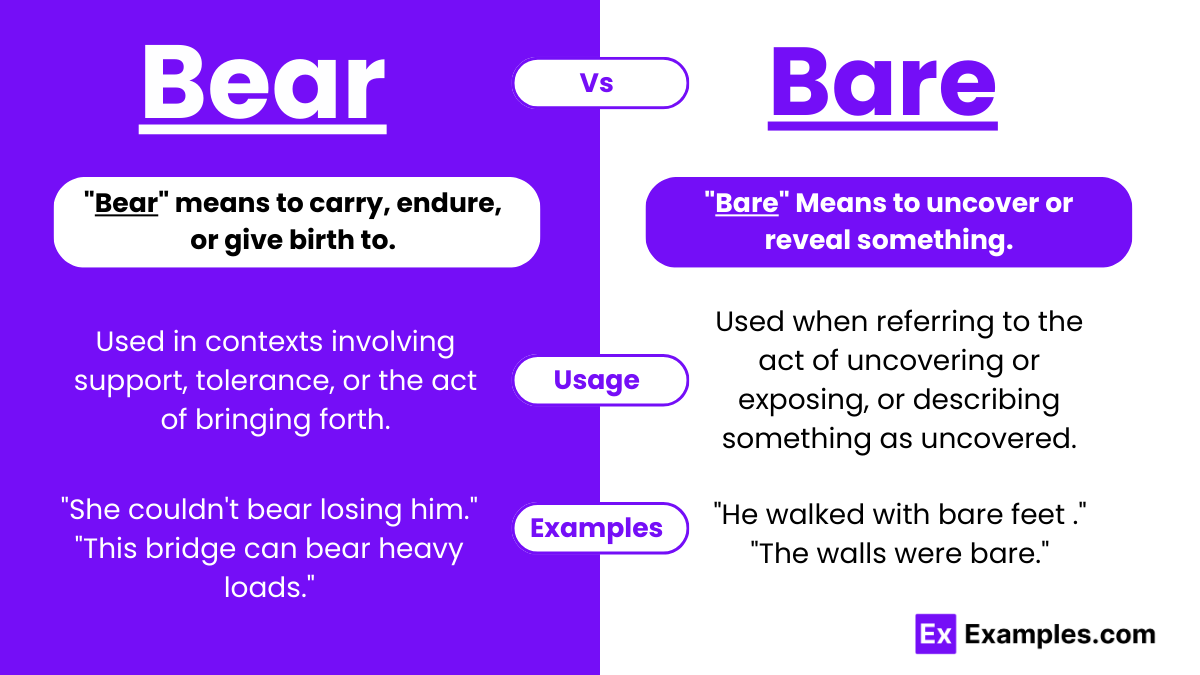Bear vs Bare – Examples, Differences, Usage
In the rich tapestry of the English language, homophones stand as a testament to its complexity and beauty. These words, identical in pronunciation yet distinct in spelling and meaning, often lead to moments of confusion. Among the most commonly mistaken pairs are “bare” and “bear.” But when it comes to expressions like “bear with me,” which is the correct choice?
To “bare” signifies the act of unveiling or exposing. Imagine peeling away layers to reveal what’s hidden beneath, akin to stripping down to the essentials or engaging in combat without the protection of gloves. It’s a word that cautions against the vulnerability of walking on shattered glass with unprotected feet or the risk involved in exposing your deepest secrets to someone untrustworthy.
Bear vs Bare – Meanings
Bear
The word “bear” operates primarily as a verb and a noun. As a verb, it encompasses several meanings, including:
- To carry or support: This can refer to both physical loads and abstract concepts, such as bearing a burden or bearing responsibility.
- To endure: To bear can also mean to tolerate or withstand something, like bearing pain or hardship.
- To give birth to: In another sense, to bear means to bring forth offspring.
- To move in a direction: As in bearing north or bearing towards a destination.
As a noun, “bear” refers to a large mammal known for its thick fur and powerful build, found in various species across the world.
Bare
“Bare,” on the other hand, is primarily used as an adjective and a verb, with its core meaning revolving around exposure or lack of covering:
- Uncovered, exposed: As an adjective, bare describes something that is not covered or clothed, such as bare feet or a bare landscape.
- To uncover or reveal: When used as a verb, to bare means to expose or make visible, which could involve revealing truths or removing something that covers, like baring one’s teeth in aggression.
The distinction between “bear” and “bare” is a vivid example of how English navigates through sound-alike words with ease, offering a rich palette of expressions to convey precise meanings. Whether it’s bearing a weight or baring one’s soul, each term carves its unique space in the language, enriching communication with its specificity.
Summary
“bear” and “bare” serve as a classic example of homophones—words that sound alike but differ in meaning and usage. “Bear” can function as both a verb and noun, embodying concepts such as carrying, enduring, giving birth, or moving towards a direction, and also referring to the large, furry mammals. In contrast, “bare” is used primarily as an adjective or verb, highlighting states of being uncovered or exposed, or the act of revealing or uncovering something. Despite their similar pronunciations, these words offer distinct meanings, illustrating the richness and complexity of English vocabulary through their precise and varied uses.
Difference Between Bear vs Bare
| Aspect | Bear | Bare |
|---|---|---|
| Meaning | Can mean to carry, endure, or give birth to. | Means to uncover or reveal something. |
| Part of Speech | Mainly used as a verb, but can also be a noun (as in the animal). | Used as an adjective or a verb. |
| Examples as Verb | – To bear the weight of the world. – To bear a child. |
– To bare one’s teeth. – To bare one’s soul. |
| Examples as Adjective/Noun | Bear (noun): A large mammal known for its strength and fur. | Bare (adjective): The room was bare of furniture. |
| Usage | Used in contexts involving support, tolerance, or the act of bringing forth. | Used when referring to the act of uncovering or exposing, or describing something as uncovered. |
| Phrases | – Bear with me. <br> – Bear a resemblance. | – Bare minimum. <br> – Bare essentials. |
How to remember the difference
To remember the difference between “bare” and “bear,” associate “bare” with “exposure” or “uncovering,” as both “bare” and “exposure” have the letter “e.” Think of “bare” as revealing or lacking coverage, like “bare feet” meaning without shoes. On the other hand, link “bear” with “carrying” or “enduring,” since “bear” has the same “a” as “carry.” Remember, “bear” can refer to enduring a burden or the animal, which can carry heavy loads. This mnemonic ties the key characteristic of each word to a letter they contain, simplifying their distinction.
When to use Bear vs Bare

When to Use “Bear”
- Carrying or Supporting: Use “bear” when indicating the act of holding up or carrying something, whether it’s a physical object or an abstract concept (e.g., “She can bear the weight of the world on her shoulders”).
- Enduring: Opt for “bear” to describe enduring or withstanding circumstances or emotions (e.g., “He bore the pain without complaint”).
- Giving Birth: “Bear” is the correct choice when referring to the act of giving birth to offspring (e.g., “The lioness will bear cubs in the spring”).
- Moving Towards: Use it to specify direction (e.g., “The ship bore northward”).
When to Use “Bare”
- Uncovered or Exposed: Choose “bare” when something is not covered or is exposed. This applies to physical objects and body parts (e.g., “She walked on the bare floor”).
- To Uncover or Reveal: “Bare” should be used when indicating the action of uncovering or revealing something (e.g., “He bared his true feelings”).
Understanding these contexts is key to employing “bear” and “bare” accurately in your writing and speech. “Bear” often relates to holding, enduring, or producing, while “bare” is all about exposure, whether it’s revealing something hidden or simply being uncovered. This knowledge allows for precise and effective communication, showcasing the depth and nuance of English.
Examples of Bear vs Bare

Examples of “Bear”
- Carry/Tolerate: He could barely bear the weight of the backpack during the hike.
- Endure: She bore the pain of the surgery with great courage.
- Give Birth: The cat went into the woods to bear her kittens.
- Hold/Support: The bridge is designed to bear heavy loads.
- Bear Fruit: After years of research, their efforts finally began to bear fruit.
Examples of “Bare”
- Uncover/Expose: He bared his chest to show the scar.
- Reveal Truths: She bared her soul in the letter to her friend.
- Lacking Covering: The walls of the room were bare, with no decorations.
- Bare Minimum: To live minimally, one must identify what constitutes the bare essentials.
- Barefoot: Walking barefoot on the beach is one of life’s simple pleasures.
Commonly confused phrases with bear or bare
- Bear with me vs. Bare with me
- Correct: Bear with me. (Meaning: Please be patient with me.)
- Incorrect: Bare with me. (This would imply undressing with someone, which is not the intended meaning.)
- Bare minimum vs. Bear minimum
- Correct: Bare minimum. (Meaning: The least amount required.)
- Incorrect: Bear minimum. (There’s no context where “bear” would be appropriate here.)
- Bear the brunt vs. Bare the brunt
- Correct: Bear the brunt. (Meaning: To endure the main force or impact of something.)
- Incorrect: Bare the brunt. (This usage is incorrect because “bare” means to uncover or reveal, which doesn’t fit the context.)
- Bare your soul vs. Bear your soul
- Correct: Bare your soul. (Meaning: To openly reveal your deepest feelings and secrets.)
- Incorrect: Bear your soul. (While “bear” can mean to carry or support, it doesn’t fit the context of revealing or uncovering emotions.)
- Bare necessities vs. Bear necessities
- Correct: Bare necessities. (Meaning: The most basic and essential requirements.)
- Incorrect: Bear necessities. (Despite the popular song from “The Jungle Book,” the correct phrase for essentials is “bare necessities.”)
- Bear witness vs. Bare witness
- Correct: Bear witness. (Meaning: To show or provide evidence; to testify.)
- Incorrect: Bare witness. (“Bare” would imply uncovering, which does not fit the context of testifying or showing evidence.)
FAQs
Do I use bear or bare?
To decide between “bear” or “bare,” consider if you mean to “endure/carry” (bear) or “reveal/uncover” (bare).
Is it bear the pain or bare the pain?
It’s “bear the pain,” meaning to endure or withstand discomfort.
Is it than I can bear or bare?
It’s “than I can bear,” indicating a capacity or limit to what one can endure or tolerate.
How do I use bare in a sentence?
Use “bare” when referring to something being uncovered or exposed: “The ground was bare of any grass.”



